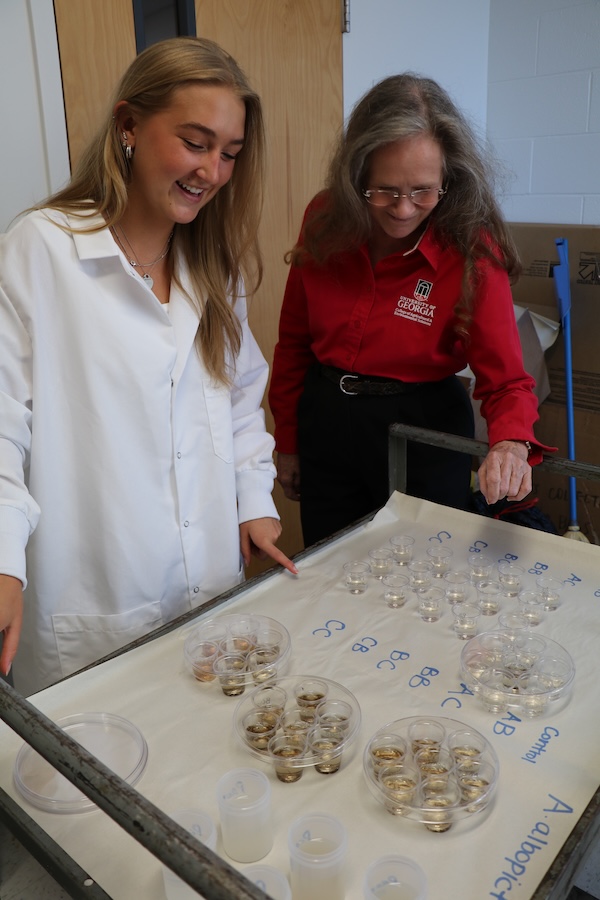
Takeaways
- REEVES program: The Research and Extension Experiences in Veterinary Entomology for Students program pairs students with participating universities to conduct research and field work on common agricultural pests.
- Veterinary entomology: Veterinary entomologists study insects and arthropods (like ticks, mites, mosquitoes and flies) that impact animal production to help disease and promote greater food production.
- Real-world experience: This program allows students who may have no background in the field to gain in-depth, collaborative academic experience.
Sydnie Frost and Sarah Stacy spent their summer travelling and exploring the outdoors. But, unlike their peers who may have been wandering around beaches and national parks, Frost and Stacy journeyed to tour the Smithsonian U.S National Tick Collection at Georgia Southern University and attend the National Livestock Insect Workers Conference in Cody, Wyoming.
They traipsed through fields to catch and monitor songbirds and collected ticks for observation. While it may not sound like a dream summer to most, this was an essential part of their summer with the Research and Extension Experience in Veterinary Entomology for Students (REEVES) Program.
Students gain hands-on research in veterinary entomology
REEVES is one of the Research and Extension Experiences for Undergraduates programs funded by the U.S. Department of Agriculture National Institute of Food and Agriculture. It was created by a collaboration between the University of Tennessee, Texas A&M University, Kansas State University and the University of Georgia.
The program provides undergraduate students from colleges around the nation the opportunity to spend their summer at these universities exploring the field of veterinary entomology, a lesser known but crucial aspect of veterinary medicine.
Veterinary entomologists study insects and their multi-legged relatives — including mites, fleas and ticks — that affect livestock animals, particularly cattle and poultry. They find ways to mitigate these pests in animal production systems to reduce livestock loss and the spread of disease.
The importance of veterinary entomology in agriculture
Despite being a crucial part of animal health, the field of veterinary entomology is often overshadowed by students’ desire to attend veterinary school. The REEVES program was created to change that. College of Agricultural and Environmental Sciences Professor Nancy Hinkle said the program aims to provide students with experience in an alternate field during a time when vet school is highly competitive.
“Typically, fewer than 10% of veterinary school applicants are accepted, so they need to have a fallback plan,” she said.
Hinkle and the UGA Department of Entomology hosted program participants Frost and Stacy this summer.
Frost, a senior animal sciences major at Purdue University in Indiana, plans to attend graduate school and enter the cattle industry.
Stacy, a sophomore veterinary health science major at Lincoln Memorial University in Tennessee, enjoys working with cattle and hopes to become a livestock veterinarian.

Neither student had any background in veterinary entomology but adapted quickly to the style of work and research necessary for the discipline. Frost and Stacy focused on mosquitoes and darkling beetles, two pests that spread disease in animals and humans.
Frost took on mosquitoes, measuring the mortality rate of two species of mosquito, Aedes albopictus and Aedes aegypti, when placed in two different larvicides at different concentrations.
Stacy tackled darkling beetles. A persistent nuisance, many researchers have given up finding ways to kill these insects that spread Salmonella and E. coli in poultry systems. Stacy placed the beetles in chicken litter and added a granular insect bait at different concentrations to see how the beetles would respond.
Such basic research is crucial in supporting healthy poultry and cattle systems and limiting the spread of disease through insects and arthropods.
Expanding career paths and perspectives
The program has allowed the girls to collaborate with the other participants and present their findings, practicing teamwork, time management, public speaking and scientific writing.
“A lot of these things you’re not going to learn just by being at your college in an undergrad classroom,” Stacy said.
Beyond the classroom, Stacy flew on an airplane for the first time when travelling for the Livestock Insect Workers Conference and Frost improved her courage in handling bugs, even catching a moth with one hand while at a restaurant.
Through the program, both girls gained a deep understanding of the crucial role of veterinary entomology and One Health, the concept that all health —human, animal and environmental — is part of one interconnected system. Although neither plans to pursue veterinary entomology, both hope their experience in the field will give them a competitive edge in the field.
“It sets us apart when application time comes, having a background with this, because it’s not as common,” Frost said.
No matter what paths they pursue, gaining specialized knowledge in veterinary entomology and learning how to connect with extension agents and entomologists will greatly improve their professional lives and was a key goal of the REEVES program, Hinkle said.
“Students don’t have to become veterinary entomologists, but they benefit by knowing that veterinary entomology exists,” she concluded.


